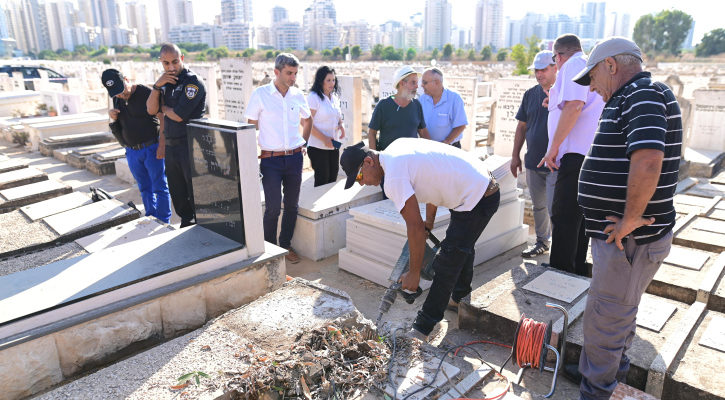The family of 17-year-old Hamama Carava doesn’t believe she is buried where state records claim, and a DNA test is to be performed.
By Batya Jerenberg, World Israel News
For the first time in the Yemenite Children Affair, the grave of a teenager who disappeared in 1949 was opened Monday to check if the remains were really hers.
Seventeen-year-old Hamama (Yona) Karava, a young mother of one, had checked into Assaf Harofe hospital a few months after her family had arrived in Israel from Yemen. Her husband, Yehuda, went to visit her every day, and one day she was simply gone.
The hospital authorities told him they had no idea what had happened to her, and then, according to his daughter, “they threw him out of the hospital.” He searched for her for years before finally remarrying.
In the late ’40s and early ’50s, some 1,000 Jewish infants and toddlers – mainly of Yemenite, Balkan and Tunisian extraction – disappeared, mostly from hospitals. The parents, new immigrants with limited knowledge of Hebrew and resources, were told that the babies had died and were hastily buried without their families present.
While the main focus of various commissions of inquiry since 1968 has been on the very young, there are some 30 similar cases of young adults between the ages of 17 and 30 who also vanished at the time.
The families have believed for decades that hospital personnel and the state colluded to bring these children to Ashkenazi families of means for adoption. The Kedmi Commission worked for six years, beginning in 1995, and determined that in 972 cases there was documentation that the children had actually died, five were alive, and the fate of 56 was unknown.
Kedmi investigators told Hamama’s son Rahamim that they had found her burial place in the Segula Cemetery in Petach Tikva. However, the name on the headstone does not exactly match that of Rahamim’s mother, marking it as the resting place of Hamama Yosef Omisi.
The mystery surrounding his mother’s disappearance has gnawed at Rahamim for decades.
“I think she was kidnapped and taken for experiments,” Rahamim said tearfully at the cemetery Monday. “We were in Israel for three months and she was hospitalized with stomach pains. Father visited her for a week. She was completely lucid. One day when he came to visit her, she had disappeared.… I want to know what happened, I want to say Kaddish [the Jewish memorial prayer], and if she’s alive, then I want to meet her.”
The charge of medical experimentation was aired during a special Knesset committee meeting in 2016, where testimony was given about four undernourished babies dying after being administered an experimental protein injection.
In 2018, after a mass demonstration, permission was granted to 18 families to exhume the graves that officially contained the remains of their loved ones, so that DNA tests could be run to put their doubts to rest. This case was included by the courts, said family lawyer Rami Tzubari, because the circumstances of Hamama’s disappearance were similar to that of the babies, and neither the documents they have nor the names match the information on her alleged grave.
This is the third grave to be opened so far so that DNA tests could be performed on their remains; the others were of babies.
The first, carried out in May, was done in order to resolve a dispute over whether a toddler, also buried in Segula Cemetery, was a Yemenite child, as the Health Ministry had claimed, or the son of a Tunisian couple. Uziel Houri was taken to the hospital as a one-year-old in 1953, and his family was told that he died, but they do not believe the authorities.
That exhumation was stopped when a second body was found in the grave, and the case has yet to be resolved in court.
In July, the supposed grave of 18-month-old Yosef Melamed was opened in the Nahalat Yitzhak cemetery near Tel Aviv. His mother, now in her 90s, has always believed that he was kidnapped and adopted in 1947 after being taken to hospital when ill. The family has not told her about the exhumation, fearing what the knowledge would do to her health.
In February 2021, the government approved a decision to “express sorrow” over the affair and compensate the families for their “suffering” with up to NIS 200,000 (appr. $60,000). Only families whose cases have been investigated by the committees of inquiry are entitled to this compensation.





